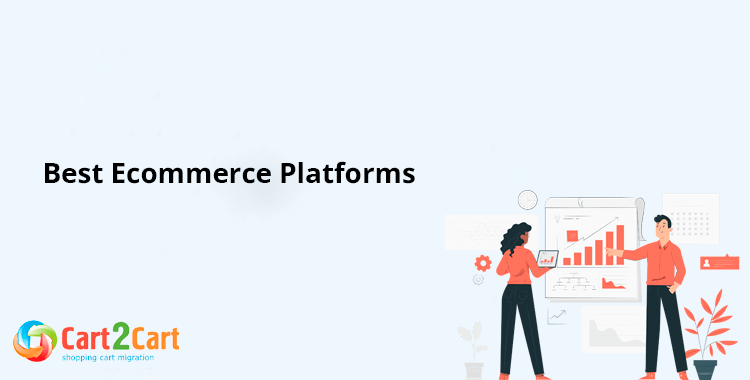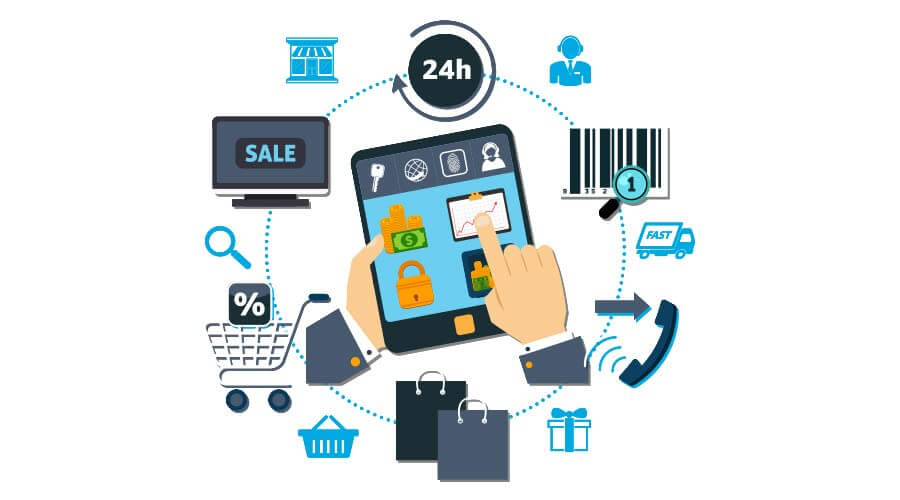 Choosing the right ecommerce platform can define the success of ecommerce stores. With the growing digital landscape, it’s crucial for business owners to find a solution that aligns with their specific needs—whether that’s a user-friendly interface, scalability, or robust features. This article dives deep into the best ecommerce platforms for 2024, providing insights to help you make an informed decision.
Choosing the right ecommerce platform can define the success of ecommerce stores. With the growing digital landscape, it’s crucial for business owners to find a solution that aligns with their specific needs—whether that’s a user-friendly interface, scalability, or robust features. This article dives deep into the best ecommerce platforms for 2024, providing insights to help you make an informed decision.
Why Choosing the Right Ecommerce Platform Matters
The right ecommerce platform is the backbone of ecommerce stores. Not only does it facilitate transactions, but it also affects customer experience, security, and overall operational efficiency. A user friendly interface is crucial for ensuring that customers can navigate the store easily. Selecting an optimal platform can impact conversion rates, customer retention, and sales growth.Key Features to Consider in Ecommerce Platforms
When assessing the best ecommerce platforms, prioritize these essential features:- Ease of Use: User-friendly platforms save time and reduce errors, ideal for business owners with limited technical knowledge.
- Customization: To stand out, your website should be customizable, aligning with your brand’s identity.
- Mobile Responsiveness: With mobile shopping on the rise, your platform should be responsive and accessible on all devices.
- Scalability: For businesses expecting growth, scalability ensures your platform can handle increased traffic and transactions.
- Security: A secure platform is essential for protecting customer data and fostering trust.

Top Ecommerce Platforms Compared
In the table below, we compare the best ecommerce platforms based on pricing, features, ease of use, and scalability.| Platform | Ideal For | Key Features | Pricing | Customization |
| Shopify | Small to large businesses | App integrations, ease of use | From $29/month | High |
| WooCommerce | Small to large businesses | WordPress integration, free core | Free, add-ons vary | High |
| BigCommerce | Growing businesses | SEO tools, scalability | From $29.95/month | Moderate |
| Wix eCommerce | Small businesses | Drag-and-drop design, easy setup | From $27/month | High |
| Squarespace | Creatives and SMBs | Beautiful templates, blogging | From $23/month | Moderate |
| Magento | Large businesses | Highly customizable, open-source | Varies | Very High |
Detailed Breakdown of the Best Ecommerce Platforms
1. Shopify
Shopify is one of the most popular ecommerce platforms, especially suited for small to large businesses. Known for its intuitive interface and vast range of features, Shopify allows even beginners to set up a store in minutes. Key features include app integrations, extensive theme options, and robust customer support.- Strengths: User-friendly, excellent for scalability, large app ecosystem.
- Limitations: Monthly fees add up with additional features.
2. WooCommerce
WooCommerce is a plugin for WordPress, ideal for those already familiar with the platform. It offers immense flexibility and control over customization, making it a favorite among established bloggers and businesses that rely on WordPress.- Strengths: Highly customizable, free core plugin, massive WordPress community support.
- Limitations: Requires hosting and basic technical skills to set up.
3. BigCommerce
BigCommerce stands out for its excellent SEO capabilities and scalability. This platform is designed for growing businesses that need a solution capable of handling significant volumes of sales and traffic. BigCommerce includes a range of built-in tools, from abandoned cart recovery to product filtering options.- Strengths: Built-in SEO tools, unlimited products, and bandwidth.
- Limitations: Limited customization compared to competitors.
4. Wix eCommerce
Wix eCommerce is a versatile, affordable platform best suited for small businesses. The drag-and-drop functionality allows users to design without technical skills. Wix also offers many templates, making it easy to create a visually appealing online store.- Strengths: Extremely user-friendly, visually driven, cost-effective.
- Limitations: Limited scalability for larger businesses.
5. Squarespace
Squarespace is widely used by creatives due to its visually appealing templates. It’s perfect for businesses needing high-quality image presentation, such as art galleries or photography portfolios. While it’s not as feature-rich as Shopify, Squarespace excels in aesthetics and ease of use.- Strengths: Beautiful designs, integrated blogging.
- Limitations: Fewer ecommerce features, not ideal for large catalogs.
6. Magento
Magento is an open-source platform best suited for large businesses with extensive customization needs. It requires technical knowledge but provides unmatched flexibility and scalability for developers. Magento is the go-to for complex ecommerce sites needing robust backend capabilities.- Strengths: Highly customizable, suitable for large enterprises.
- Limitations: Requires advanced technical expertise and resources.

Pros and Cons of Leading Ecommerce Platforms
Shopify
- Pros: User-friendly, extensive app options, reliable support.
- Cons: Higher fees with add-ons, transaction fees unless using Shopify Payments.
WooCommerce
- Pros: Free core, scalable, endless customization.
- Cons: Hosting required, more technical setup.
BigCommerce
- Pros: Built-in SEO tools, scalable.
- Cons: Limited themes, rigid design customization.
Wix eCommerce
- Pros: Easy setup, cost-effective for small stores.
- Cons: Limited scalability and advanced features.
Squarespace
- Pros: Stunning templates, great for creatives.
- Cons: Limited ecommerce features for larger stores.
Magento
- Pros: Unlimited customization, scalable.
- Cons: Requires developer knowledge, resource-intensive.
How to Choose the Best Ecommerce Platform for Your Business
Selecting the best ecommerce platform depends on several factors. Here are essential steps to guide your decision:- Define Your Business Needs: Assess the scale of your business and its future growth.
- Consider Your Budget: Look at the initial and ongoing costs, including apps and themes.
- Evaluate Ease of Use: Ensure the platform’s interface aligns with your technical abilities.
- Look for Scalability Options: Choose a platform that grows as your business expands.
- Assess Customer Support: Ensure responsive support is available, especially if you lack technical skills.
Which Ecommerce Platform Offers the Best SEO?
When it comes to SEO, ecommerce website builder BigCommerce and WooCommerce are top choices. Both provide advanced SEO tools and customization options, which are vital for achieving high search engine rankings. Shopify also offers strong SEO features, though some advanced capabilities may require additional apps for optimal e commerce performance.Emerging Trends in Ecommerce Platforms for 2024
With technological advancements, ecommerce platforms are evolving to accommodate changing consumer expectations. Here are key trends shaping ecommerce in 2024:- AI and Personalization: Platforms are incorporating AI to offer personalized experiences, helping businesses target specific customer preferences.
- Voice Commerce: With more consumers using voice assistants, platforms are optimizing for voice searches, creating new sales channels.
- AR Integration: Augmented reality (AR) tools, especially for product visualization, are becoming popular, offering a unique customer experience.
- Social Media Integration: Ecommerce platforms are enhancing integrations with social media to streamline shopping on apps like Instagram and TikTok.
Customer Support Comparisons Across Platforms
Reliable customer support is essential, especially for entrepreneurs with limited tech experience. Here’s how the leading platforms stack up in terms of support:- Shopify: Offers 24/7 customer support via chat, email, and phone, making it a top choice for reliable assistance.
- WooCommerce: Support is more community-driven; users often rely on forums, although paid support options are available through WordPress hosting.
- BigCommerce: Offers 24/7 chat and email support, with phone support available on higher-tier plans.
- Wix eCommerce: Provides customer support via chat, email, and a comprehensive help center.
- Squarespace: Known for responsive support via live chat and email, though phone support is not available.
- Magento: Offers robust support through its community and partners; enterprise users may access Magento’s direct support.
Advanced Features Worth Exploring
Some platforms provide advanced features that cater to specific business needs. Here are additional considerations for businesses requiring more from their ecommerce solution:- Multichannel Selling: Shopify, BigCommerce, and WooCommerce support multichannel sales, allowing you to sell on Amazon, eBay, and social platforms.
- Inventory Management: BigCommerce offers advanced tools for inventory management, including bulk discounts and real-time tracking.
- Flexible Payment Options: Magento and Shopify lead in payment flexibility, accommodating everything from credit cards to cryptocurrencies.
- Customizable Checkout: WooCommerce and Shopify allow deep checkout customization, which can improve user experience and reduce cart abandonment.
A Deeper Dive into Platform Security
Ensuring the security of customer information is paramount for any online business. Here’s how each platform handles security:- Shopify: Shopify is PCI-compliant by default, offering SSL encryption for all stores.
- WooCommerce: Security is highly customizable but requires setup, such as securing your hosting and installing SSL.
- BigCommerce: Fully PCI-compliant, with dedicated SSL certification for added security.
- Wix eCommerce: Offers built-in security, including SSL, but users should enable certain security features.
- Squarespace: Automatically includes SSL and security features tailored for small businesses.
- Magento: Highly secure but requires manual configuration and ongoing maintenance to protect against vulnerabilities.






